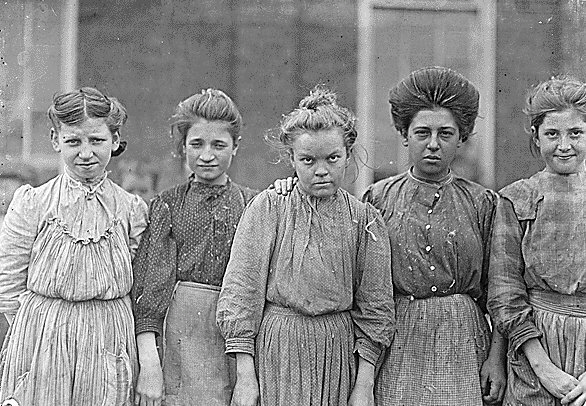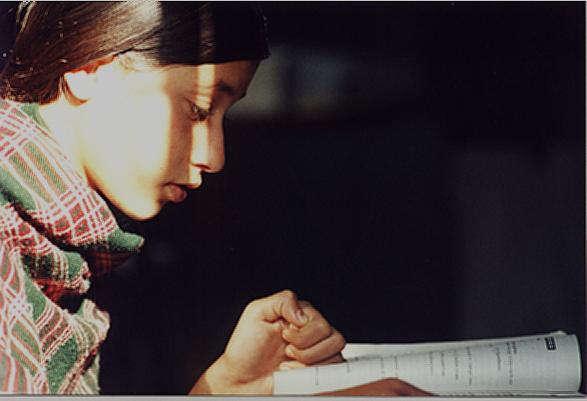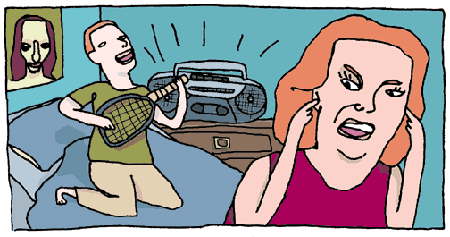i emerged from the cultural studies conference drenched in questions, several of them circulating around where different research finds an intellectual (theoretical?) home; still more having to do with the remarks that cameron mccarthy made near the conclusion of the conference in his talk on "art and the postcolonial imagination." among them, i wondered: whose art is postcolonial? that is, does one have to participate willingly in postcolonial discourses, with the intent to disrupt prevailing "dominant" sentiments, in order to participate in the broad scope of the postcolonial imagination?
in particular, i was thinking about the ways in which the young men and women with whom i have worked, learned, and imagined have created aesthetic representations that "do work" similar to that of basquiat (whom mccarthy noted) in that they offer commentary on the current social realities while presenting multiple perspectives of the often "othered" realities.
i think i just lost myself in that observation... needless to say the conference raised some questions for me about research, our explorations of culture and cultural forms, and the significance of cultural in/for/of education (this latter point better articulated by john broughton, who concluded the conference with some - as i like to call it - thread-pulling).
and finally, re: chocolate chip pedagogy - a phrase that emerged from a conversation with my sister, that has since come to mean several things (in its short 4 day-old life). approaches an interesting commentary on how educational notions (i.e. pedagogy) are situated amongst and in broader and more commonly known realities (i.e. chocolate chip cookies)...
hmmm...
4.25.2005
4.22.2005
chocolate chip pedagogy
just attended a workshop by rhonda hammer - who is presenting at the cultural studies conference going on here at tc.
first, an interesting example of clever editing
she talked a bit about how the students in her class, which i think took place at ucla, created critiques of media by using media that they were critiquing - a little bit of imovie magic and voila! a whole new reality...
'cept... earlier this morning there was a lot of talk about the use of art to critique the printed word (at another panel - youth, youth cultures, and politics - read more at: www.subjectmatters.org)anyway, a point raised by all the presenters - who were sharing their work with/about youth - suggested that we need genres other than the ones used by "dominant" forces or discourses in order to effectively critique them.
seems like a good time to bring up hybridity again... though, what of lorde's often quoted sentiment about the efficacy (or lack thereof) of the "master's tools" in dismantling said master's house... are there such clear distinctions? do we not all inhabit this house in different ways in our lives? (how) can we use the range of tools, resources, technologies, stories available to us in order to work toward productive, disruptive dismantling? what is gained? what might be lost? and for whom is there urgency in this critical work?
just day .5 of the conference... more to come!
first, an interesting example of clever editing
she talked a bit about how the students in her class, which i think took place at ucla, created critiques of media by using media that they were critiquing - a little bit of imovie magic and voila! a whole new reality...
'cept... earlier this morning there was a lot of talk about the use of art to critique the printed word (at another panel - youth, youth cultures, and politics - read more at: www.subjectmatters.org)anyway, a point raised by all the presenters - who were sharing their work with/about youth - suggested that we need genres other than the ones used by "dominant" forces or discourses in order to effectively critique them.
seems like a good time to bring up hybridity again... though, what of lorde's often quoted sentiment about the efficacy (or lack thereof) of the "master's tools" in dismantling said master's house... are there such clear distinctions? do we not all inhabit this house in different ways in our lives? (how) can we use the range of tools, resources, technologies, stories available to us in order to work toward productive, disruptive dismantling? what is gained? what might be lost? and for whom is there urgency in this critical work?
just day .5 of the conference... more to come!
4.21.2005
riot grrrl anyone??
during a recent conversation with chuck, i learned about a new book titled girl wide web, which of course got me curious and online, and within a few seconds i hit upon a page of the same name, albeit unrelated to the book - complementary, nonetheless.
girl wide web, the book, explores "issues related to the ways adolescent girls interact with the Internet." (from peter lang description). i haven't read it yet but will post more thoughts once i do.
the GWW page is part of a site described in an article as "the voice of the new girl order": Bust.com.
so check them both out, and for some very outdated background check out this article.
and p.s. - there's also a site with the url www.girlwideweb.com but it wasn't coming up when i linked to it.
girl wide web, the book, explores "issues related to the ways adolescent girls interact with the Internet." (from peter lang description). i haven't read it yet but will post more thoughts once i do.
the GWW page is part of a site described in an article as "the voice of the new girl order": Bust.com.
so check them both out, and for some very outdated background check out this article.
and p.s. - there's also a site with the url www.girlwideweb.com but it wasn't coming up when i linked to it.
4.19.2005
images of youth
a few i've come across recently:



what happens when we invite youth to image/imagine/represent themselves??



what happens when we invite youth to image/imagine/represent themselves??
4.11.2005
brr! it's cold out there! (and i'm not just talking about the weather...)
it was my objective to eat a freshly baked chocolate croissant within 24 hours of landing in montreal, pre-diabetic status notwithstanding. i succeeded only partially, purchasing and consuming said baked good with much delight, albeit not freshly baked (at 1:45 pm).
another interesting point of note: fred erickson reminding the audience during an invited presidential session that "there are no general settings" and that we are always engaged in doing work and research in specific settings. in saying so, he called on the generations-old practice of indigenous farmers who tend to each plot of soil and land with specific lenses, knowing that they cannot apply the one-size-fits-all approach to gardening. what would grow? or wouldn't?
i am reminded again of labels, and successful failure, and the purposeful construction of "us/them" dichotomies that deepen chasms and perpetuate savior mentalities. in class we began to delve into the questions surrounding the issue of what students are held to what expectations. how would we - all of us caught up in the web of education and educational discourses - fare if we truly were a we, and not an uncomfortable negotiation between "we" and "they"?
what does it take to become a "we"?
what does with look like?
another interesting point of note: fred erickson reminding the audience during an invited presidential session that "there are no general settings" and that we are always engaged in doing work and research in specific settings. in saying so, he called on the generations-old practice of indigenous farmers who tend to each plot of soil and land with specific lenses, knowing that they cannot apply the one-size-fits-all approach to gardening. what would grow? or wouldn't?
i am reminded again of labels, and successful failure, and the purposeful construction of "us/them" dichotomies that deepen chasms and perpetuate savior mentalities. in class we began to delve into the questions surrounding the issue of what students are held to what expectations. how would we - all of us caught up in the web of education and educational discourses - fare if we truly were a we, and not an uncomfortable negotiation between "we" and "they"?
what does it take to become a "we"?
what does with look like?
4.08.2005
...
what if we had no labels?
whose lives would we hear about?
whose voices would we listen for?
this past week, while working with a group of young people i have come to know over the past few months at an alternative-to-probation program, i felt these questions come crashing down on me at once... we were creating a group poem out of words we had selected the previous week - the meanings and resonances of which we had illustrated with pictures - and one young man started us off, choosing the words "Black man" and "freedom." we took turns walking up to the large post-it chart paper and adding our lines with a black crayola marker. one of the teachers added a line at the end of the poem, after we had each read the poem aloud one time. as i was writing this final line, nearly sitting on the floor, i looked up and saw the words, thoughts, hesitations, and declarations looming above me, and i thought:
who will hear these words?
and
what if we had no labels?
whose lives would we hear about?
whose voices would we listen for?
we are working now on another layer - looking for and creating images and other visual representations that emerged from the poetry - as we move toward the construction of a multimedia piece. again, i wonder about audience... and what can this (the program, our multimedia storytelling workshops) cog in the great wheel-system of the justice-education symbiosis really do? what else do we/i have to consider beyond audience and form?
what if we had no labels?
who could hear these words?
whose lives could we hear about?
whose voices could we listen for?
whose lives would we hear about?
whose voices would we listen for?
this past week, while working with a group of young people i have come to know over the past few months at an alternative-to-probation program, i felt these questions come crashing down on me at once... we were creating a group poem out of words we had selected the previous week - the meanings and resonances of which we had illustrated with pictures - and one young man started us off, choosing the words "Black man" and "freedom." we took turns walking up to the large post-it chart paper and adding our lines with a black crayola marker. one of the teachers added a line at the end of the poem, after we had each read the poem aloud one time. as i was writing this final line, nearly sitting on the floor, i looked up and saw the words, thoughts, hesitations, and declarations looming above me, and i thought:
who will hear these words?
and
what if we had no labels?
whose lives would we hear about?
whose voices would we listen for?
we are working now on another layer - looking for and creating images and other visual representations that emerged from the poetry - as we move toward the construction of a multimedia piece. again, i wonder about audience... and what can this (the program, our multimedia storytelling workshops) cog in the great wheel-system of the justice-education symbiosis really do? what else do we/i have to consider beyond audience and form?
what if we had no labels?
who could hear these words?
whose lives could we hear about?
whose voices could we listen for?
4.04.2005
purple's the new red
if THIS is what cnn.com is covering in their education section, then we have more than a long way to go...!
4.02.2005
searching for cool
so, in my usual saturday night web surfing, i landed on a site for a doc that i saw when it came out while i was in grad school: the merchants of cool. frontline (pbs) went "behind the scenes" of the relationship between teens and the media to get at the phenomenon that can be summed up as: "disposable income equals perfect marketing targets"
at any rate, they've added to their site since i last visited and it's worth a look: http://www.pbs.org/wgbh/pages/frontline/shows/cool/
now, you can watch the program online, too!
at any rate, they've added to their site since i last visited and it's worth a look: http://www.pbs.org/wgbh/pages/frontline/shows/cool/
now, you can watch the program online, too!
Subscribe to:
Posts (Atom)